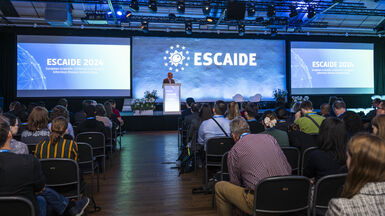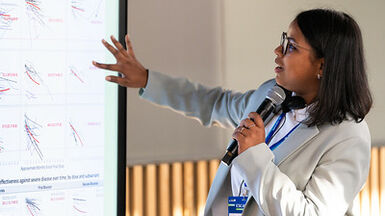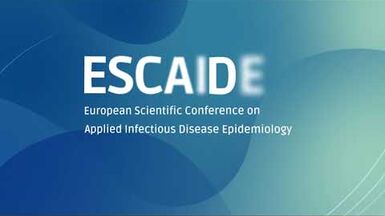Plenaries at ESCAIDE 2024
Plenaries provide an opportunity to discuss public health challenges and scientific advances, bring together experts in cross-cutting fields to enable evidence from infectious disease research and epidemiology to be translated into improvements in public health.
The content of plenaries is developed by the ESCAIDE Scientific Committee (11 cross-field members), who invite high-level speakers to deliver inspiring presentations and address questions from the audience. There will be 5 plenary sessions at ESCAIDE 2024, each chaired by members of the Scientific Committee. The format of each varies from panel discussions, interviews and debates.
Speakers at ESCAIDE 2024
Learn more about the plenary speakers at this year's conference
Plenary A: Prevention vs. Cure: what can we learn from cancer, crime and climate change?
Day 1 - Wednesday 20 November, 9:20-10:20
The debate between prevention and cure has long been discussed in the field of infectious diseases. The current paradigm places reactive medical treatment at the forefront of most research and financial investment, while public health emphasises the benefits of prioritising the prevention of avoidable illness and injury, thereby promoting better health and well-being for all. Lessons in prevention of infectious diseases can be learnt from both successes and failures in many fields – for instance cancer, crime and climate change.
In this session, Chris Dye, Professor of Epidemiology at the University of Oxford, will draw from the principles outlined in his recently published book Investing in Health and Wellbeing: When Prevention is Better than Cure (OUP 2024). Through a presentation of key lessons that he has identified in different areas, he will consider what we can learn from past achievements and failures, how we can apply these to the field of infectious diseases, and how to strike a better balance between prevention and cure.
Chairs: Kateřina Šédová (Loono, Czechia), Henriette de Valk (Santé Publique France)
Speaker: Chris Dye (University of Oxford, UK)
Plenary B: Infectious diseases in times of conflict: learning from Ukraine
Day 1 - Wednesday 20 November, 17:00-18:30
The ongoing full-scale Russian invasion of Ukraine has not only reshaped the geopolitical landscape of Europe, but it has also created considerable challenges for the prevention and control of infectious diseases. The Ukrainian health system and the health of its population has been drastically affected, with severe impacts on healthcare facilities, the interruption of critical medical treatments (including for HIV, viral hepatitis B and C, and tuberculosis), problems with accessing vaccinations, and the spread of antimicrobial resistance, among others. While the conflict has, to date, been contained inside Ukraine, the rest of Europe has had to manage the healthcare needs of large numbers of refugees, as well as face the possibility of the war – or at least the impact of the war – spreading into EU/EEA Member States.
In this session, the audience will hear from Ihor Kuzin, the Deputy Minister of Health of Ukraine, who will provide a framework for understanding the complex needs of a European public health system in times of armed conflict. Through reference to specific examples, Olga Gvozdetska, from the Public Health Centre of the Ministry of Health of Ukraine, will share lessons learned about ensuring continuity of care for patients with long-term infectious diseases; and Katarzyna Drążek-Laskowska will share her experiences in the Ministry of Health of Poland in providing effective care and immunisation services to those fleeing the conflict zone.
Chairs: John Kinsman (ECDC), Piotr Kramarz (ECDC)
Speaker: Ihor Kuzin (Ministry of Health Ukraine), Olga Gvozdetska (Ministry of Health Ukraine), Katarzyna Drążek-Laskowska (Ministry of Health Poland)
Plenary C: Surveillance of infectious diseases: how can we better tell what’s going on?
Day 2 - Thursday 21 November, 9:00-10:30
The COVID-19 pandemic has emphasised the importance of infectious disease surveillance and brought great attention to the latest advancements in surveillance. These developments include improving signal detection algorithms to reduce false alerts and using whole genome sequencing (WGS) extensively to more accurately identify infection clusters and manage outbreaks both in community and healthcare settings, thereby better informing public health actions. Moreover, besides automated surveillance of healthcare-associated infections (HAIs), developments in artificial intelligence (AI) can now also be used to enhance traditional surveillance methods in hospitals and long-term care facilities, improving the way HAIs are monitored within and beyond healthcare settings.
This session aims to explore these advancements, evaluating the advantages, disadvantages and feasibility of these approaches, and how we can tackle the challenges associated with the vast amounts of data these tools generate. The moderators will be joined by a panel of experts, including Lieke van Alphen (Maastricht University), Caterina Rizzo (University of Pisa) and Andre Charlett (UK HAS), who will discuss and share examples of the post-pandemic adjustments and developments in signal detection algorithms, the issue of ‘clusterdemics’, and the potential of AI tools in surveillance.
Chairs: Alicia Barrasa (UKHSA / EAN), Ágnes Hajdu (National Center for Public Health and Pharmacy, Hungary)
Speakers: Lieke van Alphen (Maastricht University, Netherlands), Caterina Rizzo (University of Pisa, Italy), André Charlett (UK Health Security Agency)
Plenary D: Disease X: are we ready?
Day 2 - Thursday 21 November, 17:00-18:30
The concept of “Disease X” has been adopted by the global public health community as a way to refer to a potential unknown pathogen that could cause the next pandemic. Despite the uncertainty surrounding the specific pathogen, it is still possible – and crucial – to proactively prepare for and work towards an effective response to potential pandemics. In order to understand our readiness to face the next disease X, we need to explore different facets of disease preparedness, prevention and response: from the need for research and global health infrastructures and collaboration, to developing surveillance strategies and preparedness measures, to the ability to accelerate a pandemic response when faced with emerging threats.
This session will discuss the comprehensive journey from pathogen X preparedness to pandemic response. Ana Maria Henao-Restrepo (WHO) will open with an introduction on the concept of disease X and its characteristics, as well as the current state of global readiness for unknown pathogens. Mika Salminen (THL, Finland) will explore the preparedness and prevention measures that can be put in place for disease X, including surveillance strategies, as well as public health interventions and the importance of international collaboration. Christian Drosten (Charité, Germany) will also discuss the importance of rapid responses to potential pandemics, emphasising the need to accelerate crucial processes such as genomic sequencing, vaccine and therapeutics deployment, and the upscaling of surveillance systems.
Chairs: Angeliki Melidou (ECDC), Luísa Peixe (University of Porto, Portugal), Chikwe Ihekweazu (WHO)
Speakers: Mika Salminen (THL, Finland), Ana Maria Henao-Restrepo (WHO), Christian Drosten (Charité, Germany)
Plenary E: The new old: rethinking the future of known diseases
Day 3 - Friday 22 November, 9:00-10:30
As the impact of COVID-19 diminishes, the world has seen a resurgence in various infectious diseases, possibly driven by ecological, behavioural and microbiological factors. Increased human encroachment into natural habitats and higher population densities are reviving diseases such as tuberculosis and spreading vector-borne viruses, aided by climate change. Behaviourally, for example a rise in unprotected sexual activity and decreased vaccination uptake are fuelling sexually transmitted infections and outbreaks of vaccine-preventable diseases like measles. Additionally, post-pandemic genetic changes in microbes are contributing to the resurgence of bacterial infections.
In this session, experts from these three areas will discuss the complex causes of the re-emergence of infectious diseases, and why understanding these causes can help public health professionals to effectively manage and prevent emerging health threats. Nienke Beerlage-De Jong, assistant professor at the University of Twente, will provide examples of rising vector borne diseases or zoonosis influenced by behavioural changes. The Polish sociologist Tomasz Sobierajski will examine how post-pandemic human behavioural and biological changes have influenced the rise of the transmission of diseases such as STIs, whooping cough or measles. Maria Wessman, Head of section bloodborne and sexually transmitted diseases at SSI, will explain for example how internal microbiological factors and genetic evolution, as well as post-pandemic microbiological interactions, may explain the resurgence of some diseases.
Chairs: Jacobo Mendioroz Peña (Public Health Agency of Catalonia, Spain), Nadine Zeitlmann (RKI, Germany)
Speakers: Nienke Beerlage-De Jong (University of Twente, Netherlands), Maria Wessman (SSI, Denmark), Tomasz Sobierajski (University of Warsaw, Poland)



